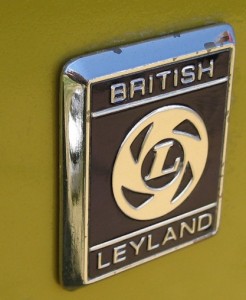An interesting article from The Yuma Sun ….
Stan Gourley is a man who obviously loves cars, particularly his 1970 Triumph TR6. The car sits in his garage, partially restored.
“You know,” Gourley said, looking at his jasmine yellow car, “it’s really sad to think that in 20 or 30 years this TR-6 would probably be a Chevrolet Camaro or a Pontiac GTO or an Oldsmobile 442.”
Gourley, a man who knows British sports cars, explains that he thinks what happened to the British Leyland Co. back in the ’70s and what is occurring to General Motors now is too similar to be ignored.
“They were a giant company that dominated the market for British cars in the ’60s and ’70s, but then they had real labor problems, the government nationalized the companies, then guaranteed billions of dollars in bailout money but formed committees to run the companies.
“The cars they produced went from bad to worse, including some of the ugliest paint schemes in the history of automobiles. Fairly quickly, within a span of 10 years, they were no longer able to hold any market share except for a few expensive niche brands that were practically hand built.
“It’s not hard to imagine the same thing happening to General Motors.”
Gourley pointed out that virtually all the companies under the British Leyland name are now gone.
“There was Jaguar, Rover, Standard and Triumph, MG, Morris, Austin Healey and the Mini. They’re all gone or owned by a foreign company now.”
Tom Wilkinson, director of news relations for General Motors, shared his thoughts on Gourley’s views.
“Yes, we’ve heard this theory before and it’s an interesting idea,” Wilkinson said in a recent phone interview. “Actually, it’s a good thing you called me, as I’m about the only guy around here old enough to remember what happened with British Leyland.”
Wilkinson pointed out that although there are similarities between General Motors and British Leyland, there are also huge differences.
“Britain had a labor government and all they cared about was preserving jobs. They nationalized the companies and took over production. By the time (GM) became involved with the government, we were already in the process of closing out plants, trimming labor and management and becoming a smaller, leaner, more efficient company.”
Wilkinson continued: “We’ve got some really terrific vehicles launching next year and no one here sees any long-term involvement with the government. The current administration has repeatedly said they do not want to be in the car business.”
Gourley bought his Triumph new in 1969. “I was being shipped out to Vietnam and I actually had my brother go down to the Triumph dealership in Atlantic City, N.J., and order it for me from the factory, so that it would be delivered by the time I got back from my tour of duty.”
The car was waiting for him when he got back from Vietnam, but then the Army shipped Gourley straight over to Germany.
“I actually ended up driving the car in Germany and the U.S. until 1992, when I moved to Yuma. I stopped driving the car then because it had real corrosion problems, and most of the rubber fittings had disintegrated. I really only started serious restoration on it about three years ago, but now that I’m retired, it’s going faster.”
Gourley said he thinks there is a real chance General Motors will never be able to shake loose from government control and that could spell the end of the company.
“None of the European car companies are really profitable, with the possible exception of Mercedes and they haven’t been doing that well lately. Most of the rest of them, like Renault and Fiat, are government controlled and only manage to sell cars in their own countries.
“Actually, the idea that Fiat is going to rescue Chrysler is laughable, as Fiat has lost count of the number of times they’ve been bailed out by the Italian government.”
Once again Gourley voiced his concern for GM’s future. “Once the government gets dug in at General Motors, with their committees and paperwork and bureaucrats, it’s going to be over. They’ll be just like British Leyland, and they will never build a great car again. They never should have taken the money.”



